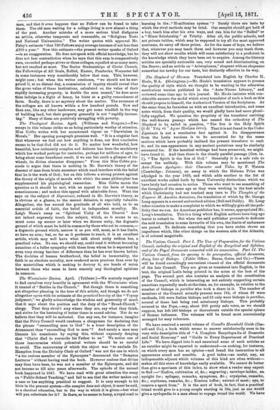The Theological Review. April. (Williams and Norgate.)—Two essays in this
volume strike us as being particularly worthy of attention. Miss Cobbs writes with her accustomed vigour on "Darwinism in Morals." Her opening paragraph promises well. "It is a singular fact that whenever we find out how anything is done, our first conclusion seems to be that God did not do it. No matter how wonderful, how beautiful, how intimately complex and delicate has been the machinery which has worked perhaps for centuries, perhaps for millions of ages, to bring about some beneficent result, if we can but catch a glimpse of the wheels, its divine character disappears." From this Miss Cobbs pro- ceeds to argue that there is nothing in Mr. Darwin's theory of the descent of man from brute ancestors which need interfere with the belief that he is the work of God; but on this follows a strong protest against the theory of the origin of morals with which the same philosopher has
supplemented his physiological researches. Miss Cobbs meets the question as it should be met, with an appeal to the facts of human consciousness ; and makes this appeal with admirable force. What she says on the subject of Repentance, reduced in Mr. Darwin's theory, as is obvious at a glance, to the merest delusion, is especially valuable. Altogether, she has earned the gratitude of all who hold, as to an essential article of faith, the belief in independent morality. Mr. Leigh Mann's essay on "Spiritual Unity of the Church " does not indeed expressly touch the subject, which, as it seems to us, must come up sooner or later when we discuss unity, the dogmatic ground of which must be held in common by those who act in common,— a dogmatic ground which, narrow it as you will, mast, as it has limits, so have an area; bat, so far as it professes to reach, it is an excellent article, which may well have what talk about unity seldom has, a practical value. No one, we should say, could read it without becoming conscious of a fuller sympathy with those from whom he is separated by even very strong barriers of difference than be has ever known before. The doctrine of human brotherhood, the belief in immortality, the faith in an absolute morality, now rendered more precious than ever by the materialism which is seeking to destroy it, are bonds of union between those who seem to have scarcely any theological opinions in common.


































 Previous page
Previous page